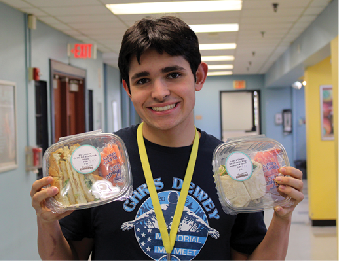Television Review: Atypical
January 25, 2019
Getting through high school is a difficult task. Imagine what it would be like to maneuver your way through that uncertain terrain if you had a disorder that caused difficulty communicating, forming relationships with others, or even understanding abstract concepts. The Netflix original series, Atypical, created by Robia Rashid, gives viewers insight to what it’s like going through adolescence as an autistic teen. The series follows the Gardner family. The Gardners face the same problems as many other American families: sibling conflicts, laborious parenting, and a complicated marriage, except that they deal with these tribulations while raising their son Sam, who is living on the autism spectrum.
The creator of this show, Robia Rashid, has done work for other popular situation comedies like Will & Grace, How I Met Your Mother, and The Goldbergs, but writing Atypical was a break from her usual content. Rashid was inspired by the increase in the number of kids diagnosed with autism, and their journey to understand how they are ‘different.’ Sam struggles with impairments that include sensitivities to noise and touch, anxiety in social situations, as well as obsessive-compulsive tendencies. Over the two seasons that the show has aired, viewers have watched as Sam matures into an adult; falls in love, and gets a girlfriend.
The series does a great job depicting a variety of points of view from several characters. After all, there are many challenges that go along with having an autistic member of your family. For example, Sam’s younger sister, Casey, struggles with having an autistic sibling and the impact it has on her life. Casey often feels that her brother takes up a large amount of her parents’ focus and is faced with the dilemma of understanding why her brother needs attention while wanting a fair share for herself. She also feels a great responsibility to protect her brother from the challenges of high school. This uniquely shows how autism can affect a family.
But viewers also get to see that the Gardeners’ lives are really no different than most families. Although Sam has special challenges, the Gardeners face issues that are commonplace in households everywhere.
Change is inevitable, and for many people it proves to be an immense challenge. This is magnified through Sam’s journey toward maturity. Atypical helps people relate to the autistic community in a way that they may have not been able to previously.
The episodes are about thirty minutes each, but it is easy to get drawn into the drama of the Gardners’ life, and binge a season (or two) in a day. Atypical does a strong job depicting life surrounding autism and encouraging a sense of empathy in its viewers.








